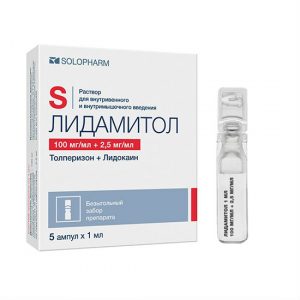Description
Sazar
Packing
15 pcs – blister packs (2) – packs of cardboard.
10 pcs – blister packs (3) – packs of cardboard.
Pharmacological action
Anticonvulsant.
The mechanism of action is associated with the influence on the voltage-gated sodium channels of the presynaptic membrane. This leads to a decrease in the release of mediators into the synaptic cleft, primarily glutamate – an exciting amino acid that plays an important role in the formation of epileptic discharges in the brain.
Pharmacokinetics
After oral administration, lamotrigine is rapidly and completely absorbed from the digestive tract. Plasma Cmax is reached after approximately 2.5 hours.
Plasma protein binding is 55%. It undergoes intensive metabolism with the formation of the main metabolite of N-glucuronide.
T1 / 2 in adults averages 29 hours. It is excreted by the kidneys mainly as a metabolite, about 8% of the active substance is excreted unchanged.
T1 / 2 in children is less than in adults.
Indications
Partial and generalized tonic-clonic seizures (more often in cases of resistance to treatment with other anticonvulsants).
Contraindications
Severe hepatic impairment, hypersensitivity to lamotrigine.
Use in cases of impaired liver function
Contraindicated in severe impairment of liver function.
Use in cases of impaired renal function
Use with caution in patients with renal failure.
Use in children
Lamotrigine should not be used in children under 2 years of age.
Use in elderly patients
Lamotrigine should not be used in elderly patients.
Use during pregnancy and lactation
Clinical data on the safety of lamotrigine during pregnancy and lactation are insufficient.
When deciding whether to use during pregnancy, the expected benefit of the therapy for the mother and the potential risk to the fetus should be compared.
Preliminary data show that lamotrigine passes into breast milk at a concentration of 40-45% of the plasma concentration. In a small number of infants whose mothers received lamotrigine, no side effects were noted.
Composition
Tablets 1 tab.
lamotrigine 25 mg
* is the non-proprietary international name recommended by the WHO – lamotrigine.
15 pcs – blister packs (2) – packs of cardboard.
Dosage and administration of
When administered orally for adults and children over 12 years of age, the initial single dose is 25-50 mg, maintenance doses are 100-200 mg / day. In rare cases, doses of 500-700 mg / day may be required.
For children aged 2 to 12 years, the initial dose is 0.2-2 mg / kg / day, the maintenance dose is 1-15 mg / kg / day.
The maximum daily dose for children aged 2 to 12 years, depending on the treatment regimen used, is 200-400 mg.
The frequency of administration, the intervals between doses with increasing doses depend on the treatment regimen used, the patient’s response to the treatment.
Side effects
From the side of the central nervous system: headache, dizziness, drowsiness, sleep disturbances, feeling tired, aggressive, confused.
From the digestive system: nausea, impaired liver function.
From the hemopoietic system: leukopenia, thrombocytopenia.
Allergic reactions: skin rash (usually maculopapular), angioedema, Stevens-Johnson syndrome, toxic epidermal necrolysis, lymphadenopathy.
Drug Interaction
When co-administered with anticonvulsants, inducers of metabolism in the liver (including phenytoin, carbamazepine, phenobarbital, primidone) accelerate lamotrigine metabolism.
When lamotrigine and carbamazepine or phenytoin are co-administered, T1 / 2 lamotrigine is reduced.
There have been reports of dizziness, ataxia, diplopia, blurred vision, and nausea in patients receiving carbamazepine after initiation of lamotrigine treatment.
Owing to the inhibition of microsomal liver enzymes under the influence of sodium valproate, lamotrigine metabolism is slowed down with simultaneous administration, and T1 / 2 lamotrigine is increased.
Overdose
Single dose administration exceeding maximal therapeutic doses of 10 20 times has been reported.
Symptoms: nystagmus, ataxia, disorders of consciousness before coma.
Treatment: hospitalization and appropriate symptomatic therapy. In the case of recent (less than 2 h) administration of the drug, it is necessary to wash the stomach.
Storage conditions
In the dark place at a temperature of 15 25 ° C.
Keep out of the reach of children.
Expiration
3 years.
Do not use after the expiry date stated on the package.
Deystvuyuschee substances
Lamotrigine
terms of sale from
pharmacies Prescription
dosage form
dosage form
tablets
Alkaloid AD Skopye, Macedonia




